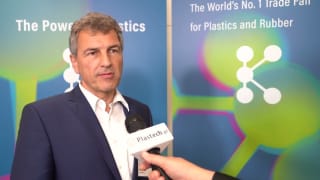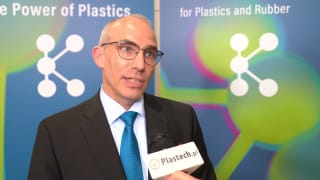
Arburg will use K 2025 to demonstrate how combining injection moulding with in-mould labelling can produce packaging efficiently and with high process reliability while using up to 20 per cent less material. The exhibit centers on a thin-walled round PP cup with a tamper-evident closure that features a geometry not achievable in thermoforming. The high-performance electric Allrounder 720 A “Ultimate”, equipped with a 3,200 kN clamping unit and a 1300 injection unit, is configured specifically for this application with an emphasis on performance, energy efficiency and precision. The machine attains high injection volumes and injection speeds of up to 400 millimetres per second. In the demonstrated setup, particular attention has been paid to material-saving part design and a consistently energy-efficient process window. The exhibit will run on Stand 13A13.
Injection compressing moulding: material and energy savings
Injection compressing moulding delivers multiple benefits compared with conventional injection moulding. It enables significantly thinner wall sections, requires lower injection pressure and allows tool temperatures of 20 degrees Celsius instead of 12 degrees Celsius. According to Arburg, process refinements have yielded energy savings of up to 30 per cent alongside a marked reduction in component weight. In contrast to thermoforming, the process also supports the production of complex geometries. Through an optimised interplay of the machine and peripherals, Arburg’s application and process specialists reduced the required clamping force for the K 2025 exhibit by around 20 per cent, from 2,900 to 2,300 kN. This contributes to savings in machine and purchase cost, footprint, wear and connected load.
High-throughput IML cell and separable labels
The electric Allrounder 720 A “Ultimate” operates a 4-cavity mould from Brink to produce IML cups weighing 12.4 grams each and holding 400 millilitres. At a wall thickness of just 0.37 millimetres, the cycle time is around 3.95 seconds. The high injection speed required for the thin-wall application is provided by precise servo motors from Arburg’s sister company AMKmotion. A side-entry robot from Brink is integrated into the production cell to insert the labels and subsequently remove and stack the finished cups on a conveyor belt. A special Next Cycle label can be separated completely from the cup during the recycling process, enabling the PP product to be recycled by type after use.

The recyclable IML round cups made of PP mono-material have a wall thickness measuring just 0.37 millimetres.
Process monitoring and assistance
For process monitoring, the mould is equipped with three displacement and embossing sensors positioned in the main plane, in the embossing plane and on the needle gate nozzle. This arrangement enables fine-tuning of the chronological sequence of the stamping process, from injection and tool closing to control of the needle-type shut-off nozzle. Smart assistance and pilot functions in the Gestica control system, such as the “aXw Control ScrewPilot”, compensate for deviations in the filling process. This stabilises mould filling and supports process reliability and consistently high part quality.

An electric Allrounder 720 A “Ultimate” has demonstrated energy- and resource-saving injection moulding at trade fairs. At K 2025, it will be producing thin-walled IML cups with high-quality closures for the first time.




